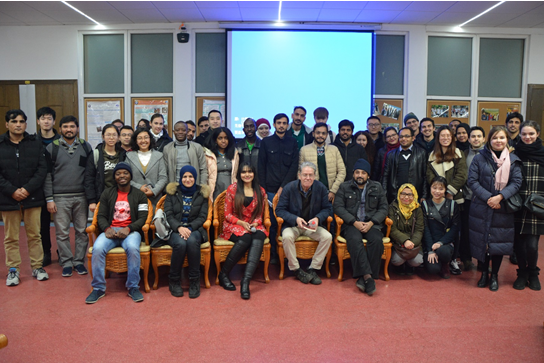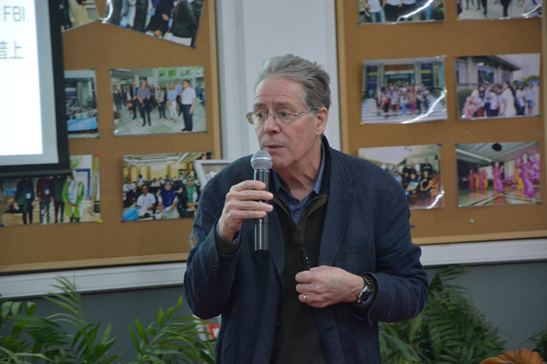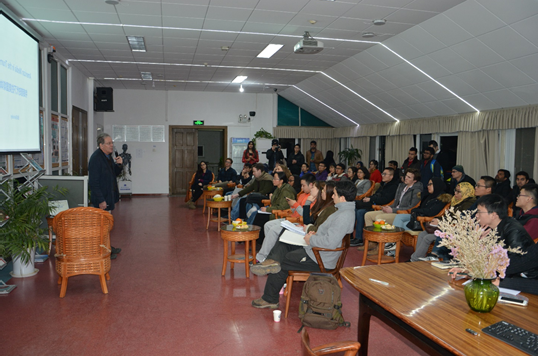
On the fourth floor of LIESMARS, a school division on the Information Sciences Campus here at Wuhan University, there were wicker chairs and snack-adorned end tables. Most of the chairs were filled by attendees last Friday evening with some having to stand in the back of the room. Everyone present came to hear one man’s answer to the question that still haunts the world: what is going on with United States President Donald Trump?
Professor Bill Berkeley, a former editor for the New York Times, a former foreign correspondent for Atlantic magazine, and an adjunct professor at Columbia University, enlightened everyone on Donald Trump and what he calls his “running war” against “fake news.”
To start, he made it clear that he does not speak for the United States government while also clarifying what his lecture would be like. As he explained it, the chief responsibility of a journalist is to tell a truth from a lie. That evening, however, Professor Berkeley did more than that and shared his own opinions of Donald Trump. While the willingness to be so un-objective and opinionated is somewhat unprecedented for a journalist, in an era of “fake news,” Professor Berkeley found it quite appropriate.
Within an hour and fifteen minutes, Professor Berkeley touched on a wide range of issues concerning Trump and his presidency, the first one being his comfortable use of “provable falsehoods.” These lies are so outrageous they are rather simple to spot and argue against. Nothing proves this more than the New York Times front page publication titled, “Trump’s Lies.” According to Berkeley, such an action has never been taken by any mainstream editorial in his lifetime.

Of course, he also talked about Donald Trump and his “running war” with the media and “fake news.” “Fake news” is a concept that has been circulating the internet for quite some time, but has only recently entered the mainstream consciousness, according to Professor Berkeley. By and large, this has to do with Donald Trump and his incessant repetition of the word in reference to the “liberal” media. The use of the term has been so influential that officials in Myanmar, when asked about the Rohingya, a minority group that has not be recognized as legal citizens of Myanmar, they simply reply “no such thing as Rohingya. That’s fake news.” This is just one more troubling sign of how the current United States president is shamelessly encouraging the use of disinformation for political gain.
Obviously, there is no way you can talk about Donald Trump without mentioning his scandal with the Russian government.
In the summer of 2016, in the midst of his campaign for presidency, there was a meeting held in Trump Tower between two people close to the Trump campaign, Jared Kushner and Paul Manafort, and a Russian lawyer with ties to the Russian government, Natalia Veselnitskaya. This meeting and its details were kept off the official agenda yet were brought to light in the news before Trump’s election. Now, it is officially being investigated by the U.S. Federal Bureau of Investigation and, over the past several months, has been bringing new insight into the Trump campaign’s alleged collusion with the Russian government to ensure his victory over Hillary Clinton.
Even though a professor from the “bluest district of the bluest city of the bluest state” in the United States, Berkeley still recognized that such an American president has made one form of journalism all the more important: fact-checking. To sort through every little thing anyone says is a large job in and of itself, yet sorting through the outrageous and frequent nonsense uttered by your own president is an even larger job and requires more people. In light of this fact, Professor Berkeley even half-heartedly thanked the Mr. Trump for reviving the industry.

After some questions from the audience about Berkeley’s own career and some of Donald Trump’s controversial policy decisions, the night came to a close, leaving everyone with a somewhat clearer understanding of the United States’ conundrum and how journalism can continue moving forward. It is important to remember that while the citizens of the United States did choose this president, it does not mean that some citizens will not hold him accountable. In fact, that is the purpose of journalism. To tell the truths from the lies is to allow the people to understand the facts and decide the fate of their own nation accordingly. As Hannah Arendt once stated:
“The moment we no longer have a free press, anything can happen. What makes it
possible for a totalitarian or any other dictatorship to rule is that people are not informed; how can you have an opinion if you are not informed? If everybody always lies to you, the consequence is not that you believe the lies, but rather that nobody believes anything any longer.”
It is clearer now, more than it has ever been, that we must distinguish the true from the false for, if we do not, the fate of our own values could be at stake.
Source: School of International Education